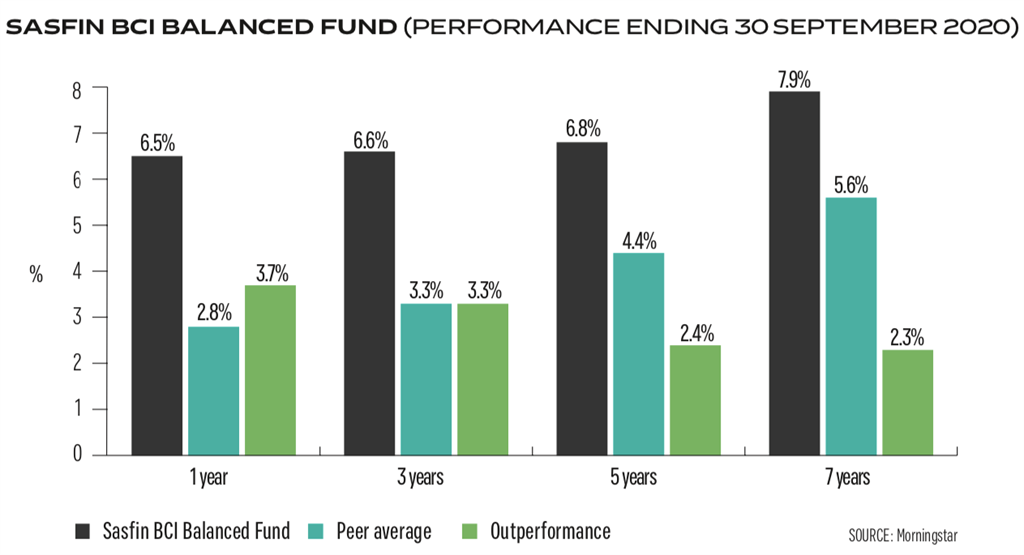
Cash is now like a safe car with a top speed of only 30km/h. In the same vein, bonds are also relatively safe, but can reach a top speed of 120km/h, delivering better returns than ‘super-safe’ cash.
The world is rapidly changing and now your approach to asset allocation, may be the time to seriously re-examine according to Philip Bradford, Sasfin’s chief investment officer and multi-award-winning portfolio manager.
He points out that during the 1980s, interest rates in the US, UK and Europe were mostly between 10% and 20%, and currently they’re zero or even negative. Locally, they’re close to their lowest in history and seem destined to remain there for some time.
Over that same period globally, stock markets generally did well, with the JSE being one of the best performers in the world, he adds. And significantly, despite recent poor performance, it remains one of the top performers over the past 120 years.
Bradford notes further that the US stock market, after delivering zero returns from 2000 to 2010, rocketed during the past decade, but is unlikely to maintain anything like that momentum in the decade ahead.
Against this backdrop, he asks: “Given that interest rates are at all-time lows in most places around the world, and with the prevailing uncertain economic and stock market outlook, does it still make sense to repeat the way you invested during the past 30 years?”
South African investors were generally spoiled during that period, he says. “Our stock market, bonds and even cash averaged double-digit returns per year, comfortably beating inflation.Many investors continue to assume that given this situation, they ought to comfortably out perform inflation by more than six percentage points per year into the future if most of their retirement savings are invested in the JSE.
“This has resulted in SA pension funds typically placing 65% to 75% of their assets in stock markets, with the large majority of that in the JSE and much less to global equities. Obviously, this hasn’t paid off in the recent past because even cash has beaten the local stock market by a mile”.
While recognising this, Bradford’s team adapted their investment strategy to the changing environment. “In the Sasfin BCI Balanced Fund during the past six years,for instance, we significantly reduced our investors’ local equity exposure in favour of both high-yielding local bonds and foreign equities, culminating in exceptional returns and the fund winning a coveted Morningstar award earlier this year.
This means, says Bradford, that some local bonds in the fund now provide a guaranteed return of eight percentage points above current inflation. It’s extremely attractive considering that the riskier stock markets typically return a mere five to six percentage points above inflation.
“Most pension funds, I believe, should consider changing their asset allocation policies to take advantage of this. The Sasfin BCI Balanced Fund currently has only 15% invested in the local stock market, compared with the average SA pension fund manager’s 40% or more invested in local equities. Clearly, Bradford says, when bonds with much lower risk deliver better returns than you might have hoped from local equities, it doesn’t make sense to take more risk than you need to.
He also humorously likens domestic equities to an old Ford Cortina XR6: “Really fast in the 80s and 90s, but not a reliable bet in 2020.” Another reason for most pension fund managers being excessively exposed to local equities is that they’re bound by pension fund regulations, Bradford says. “These rules restrict a fund’s offshore exposure to 30%, which almost forces a manager of a fund with a high growth target to be overly skewed towards domestic equities.
“And inimically the FTSE/JSE All Share Index currently has little exposure to the SA economy, essentially being a largely global index with very concentrated exposure to a handful of companies”.
Looking forward, Bradford reiterates that the outlook for local and global equities is uncertain and cash is no longer a safe hiding place that will provide high returns like it did in the past.
“I believe that investors should have the majority of their equity exposure invested offshore and most of their local exposure in SA in bonds that pay very high interest. In SA you no longer need to take inordinate risk to comfortably beat inflation.”
“Cash is no longer an option because the rates are close to 3% and are likely to stay low for a long time”, he says. “So, ironically, cash has become a riskier investment in that it virtually ensures that you won’t achieve your retirement goals. “It’s like a very safe car with a top speed of 30km/h, whereas with bonds you are also relatively safe, and the vehicle is comfortably able to travel at 120km/h.”




 Publications
Publications
 Partners
Partners













